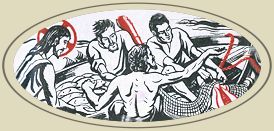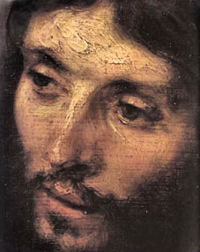» Enjoy our Liturgical Seasons series of e-books!
"I give praise to you, Father, Lord of Heaven and earth, for although you have hidden these things from the wise and the learned you have revealed them to little ones. Yes, Father, such has been your gracious will. All things have been handed over to me by my Father. No one knows the Son except the Father, and no one knows the Father except the Son and anyone to whom the Son wishes to reveal him" (Matt 11:25-27).
Click here for commentary on the readings in the Extraordinary Form of the Roman Rite.
The Optional Memorial of St. Maria Goretti, virgin and martyr, is superseded by the Sunday liturgy.
Sunday Readings
The first reading is taken from the Book of the Prophet Zechariah 9:9-10 and indicates that the humility asked for by Jesus is the kind that he himself endured, for he came in meekness and without pageantry, yet his dominion would be to the ends of the earth. The example of the humble servant is the very person of Jesus himself who invites us in the second part of the gospel to come to Him for refreshment and rest. — A Celebrants Guide to the New Sacramentary - A Cycle by Kevin W. Irwin
The second reading is from the Letter of St. Paul to the Romans 8:9, 11-13 and contains one of the most important yet often misunderstood themes of St. Paul. The hellenistic dichotomy between the lower and higher nature is not found here, for flesh and spirit mean the whole man and the whole man stands in need of redemption by Christ. The Pauline teaching is not that part of man is redeemed and part of him is damnable. Rather man's whole personality is redeemed by the sacrifice of Christ. The vocation of the Christian, both "body" and "soul," is to conform his already redeemed person to the same Spirit he has already received at baptism. — A Celebrants Guide to the New Sacramentary - A Cycle by Kevin W. Irwin
The Gospel is from St. Matthew 11:25-30. Pagans and Jews had the same hardships of life to face as we have, and even greater ones. They earned their daily bread with the sweat of brow and body. Their illnesses were more frequent and less bearable than ours, for they had not the medical helps that we have. Death came to young and old then as it does now, but for them it was a final parting from loved ones, and no hope of a future happy meeting served to lighten their sorrow. All their crosses were crushing weights, sent to make life more miserable. Life on earth was passed in gloom and darkness and there was no shining star in the heavens to beckon them on or give them hope.
Surely God is good to us, to put us into this world at this day and age, and give us the light of faith, and the knowledge of God and of His loving plans for us, which make the burdens of this life so relatively light and even so reasonable for us. We still have to earn our bread. We still have sickness and pains. We still have death stalking the earth, but unlike the people before Christ we now see a meaning to all these trials.
The yoke of Christ is not really a yoke but a bond of love, which joins us to Him, and through Him, to our loving Father in heaven. The rule of life which He asks us to keep, if we are loyal followers of His, is not a series of prohibitions and don'ts. It is rather a succession of sign-posts on the straight road to heaven, making our journey easier and safer. He does ask us to carry our cross daily, that is, to bear the burden of each day's duty, but once the cross is grasped firmly and lovingly it ceases to be a burden.
Ours is a world which is in an all-out search for new idols. It is a world which has left the path marked out by Christ, and forgotten or tried to forget, that man's life does not end with death. To be a Christian and to have the light of faith to guide our steps in this neo-pagan darkness, is surely a gift, and a blessing from God, for which we can never thank Him enough. Thank you, God, for this gift. Please give us the grace and the courage to live up to it and to die in the certainty that we shall hear, as we shut our eyes on the light of this world, the consoling words, "come you blessed of my Father, possess the kingdom prepared for you."
Excerpted from The Sunday Readings by Fr. Kevin O'Sullivan, O.F.M.
Commentary for the Readings in the Extraordinary Form:
Fourth Sunday after Pentecost
 "Put out into the deep . . . lower your nets for a catch . . . Henceforth thou shalt catch men" (Gospel)
"Put out into the deep . . . lower your nets for a catch . . . Henceforth thou shalt catch men" (Gospel)
Simon Peter received the "call to action." How did he respond? "At Thy word I will lower the net." What was his reward? "All . . . were amazed at the catch." The call to Catholic Action has been repeated by the Popes in our day. "They (have) beckoned to their comrades . . . to come and help them" (Gospel).
More than ever in this age of global war, "all creation groans . . . in pain," waiting for "redemption" from life-killing sin; waiting for its "adoption" into Divine Life "as sons" of God (Epistle). For their sake we must act as members of a Church Militant, not of a Church "pacifist" or sleeping. "Enlighten my eyes, that I never sleep in death" (Offertory).
Do not be afraid to answer this call for Catholic Action; "put out into the deep!" "Lower your nets!" even though "armies in camp should stand together against" you (Introit).
Excerpted from My Sunday Missal, Confraternity of the Precious Blood








